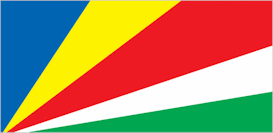Seychelles - Government
 The president is both the chief of state and head of government and is elected by popular vote for a 5-year term. The Council of Ministers serves as a cabinet, and its members are appointed by the president. The unicameral National Assembly has 34 seats--25 elected by popular vote and 9 allocated on a proportional basis to parties winning at least 10% of the vote; members serve 5-year terms.
The president is both the chief of state and head of government and is elected by popular vote for a 5-year term. The Council of Ministers serves as a cabinet, and its members are appointed by the president. The unicameral National Assembly has 34 seats--25 elected by popular vote and 9 allocated on a proportional basis to parties winning at least 10% of the vote; members serve 5-year terms.
The judicial branch includes a Court of Appeal and Supreme Court; judges for both courts are appointed by the president. Seychelles’ legal system is a blend of English common law, the Napoleonic Code, and customary law. Civil matters, such as contracts and torts, are governed by the Civil Code of Seychelles, which is derived from the French Napoleonic Code. However, the Company Law and criminal laws are based on British law. In both civil and criminal matters, the procedural rules derive from British law. Although the judicial branch is independent of the executive branch, many Seychellois believe that well-connected individuals receive special treatment in the courts. Seychelles does not maintain a specialized commercial court. Judgments of foreign courts are governed by the Foreign Judgments (Reciprocal Enforcement) Act of 1961, Section 3. The World Bank ranked Seychelles 129th out of 190 in enforcing contracts in its 2017 Ease of Doing Business Report.
Defendants have the right to a fair, public trial; are considered innocent until proven guilty; and have the right to be present at their trials and to appeal. Defendants have the right to be informed promptly and in detail of the charges against them, with free interpretation as necessary from the first court appearance through all appeals. Only cases involving charges of murder or treason use juries. The constitution makes provision for defendants to present evidence and witnesses and to cross-examine witnesses in court. Defendants have the right to access government-held evidence, although responses to such requests often were delayed. The law provides the right of defendants to consult with an attorney of choice or to have one provided at public expense in a timely manner and to be provided adequate time and facilities to prepare a defense. Defendants have the right not to confess guilt, not to testify, or to enter a plea. The law extends these rights to all defendants.
Seychelles has had a multi-party system with the adoption of a new constitution in 1993. Since then, multi-party elections took place in 1993, 1998, 2001, 2006, 2007, and 2008. The Parti Lepep won the presidency and majority in the National Assembly in all of the elections, except for the 2008 by-election that it boycotted.
|
NEWSLETTER
|
| Join the GlobalSecurity.org mailing list |
|
|
|

